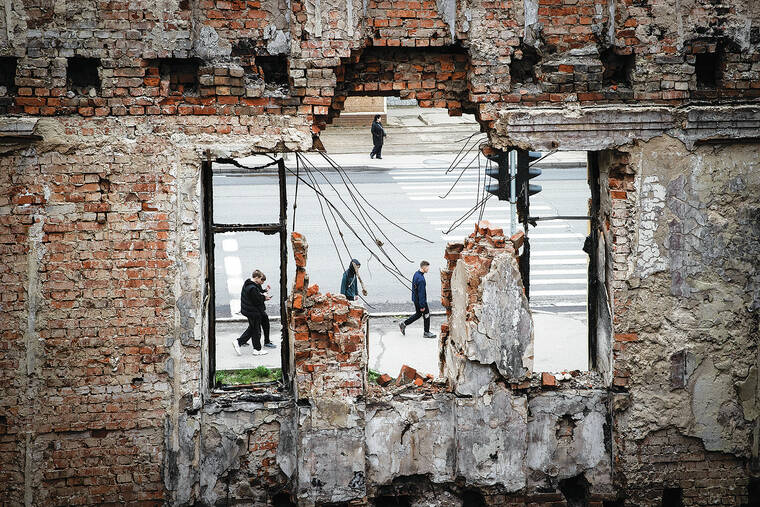Kharkiv is unbreakable’: A battered city carries on
KHARKIV, Ukraine — The espresso machine was warming up and Liliia Korneva was counting cash at the coffee shop in Kharkiv where she works when a powerful Russian bomb detonated nearby, sending up a deafening explosion and knocking her to the floor.
“I can’t describe in words how it felt, it was terrifying,” said Korneva, 20. She was not hurt, though the courtyard where the bomb fell was destroyed and a man riding a bicycle nearby was killed, according to city officials.
ADVERTISING
Just a day later, the cafe was open again. Kharkiv, Ukraine’s second largest city, is open for business, too, despite a sustained bombing campaign that is among the most devastating of the entire war and growing fears that Russia might launch a renewed offensive aimed at taking the city.
Russian attacks have destroyed all three major power stations, but residents continue to live and work with only a few, often unpredictable, hours of electricity each day. More than 100 schools have been damaged or destroyed but classes go on, deep underground in subway stations. Dozens of fire and paramedic stations have been blown up, putting first responders in daily jeopardy but failing to deter them from their jobs.
“When a rocket hits, within three to four hours, all the glass is cleaned up, all the central roads are cleared,” said Andrii Dronov, the 39-year-old deputy chief of the Kharkiv Fire Department. “By morning, it looks like nothing happened and there were no explosions.”
As the attacks intensify, though, there are real questions about how much longer Kharkiv, 25 miles from the Russian border, can hold on without more robust air defenses. Since March, Russia has been bombarding it for the first time with one of the deadliest weapons in its arsenal: powerful guided bombs known as glide bombs, dropped from warplanes, that deliver hundreds of pounds of explosives in a single blast.
“It’s a strategy to intimidate people, a strategy to make people leave their homes, to make people evacuate,” Kharkiv’s mayor, Ihor Terekhov, said during a recent interview, conducted at a secret location since his office is a target. “It’s the destruction of the city itself.”
Since January, Ukrainian officials said, more missiles have struck Kharkiv, currently home to 1.3 million people, than at any time since the first months of the war. Ukrainian authorities have ordered the mandatory evacuation of villages to the east of the city as violence along the border escalates.
Russia’s foreign minister, Sergey Lavrov, last week became the highest ranking Kremlin official to signal that Moscow has designs on seizing Kharkiv, saying it “plays an important role” in President Vladimir Putin’s stated desire to create a “sanitary zone” along the Russian border. Military analysts have noted a marked increase in military activity in the area.
It remains unknown if Russia is seriously considering an attack from the north. It may simply be trying to stretch Ukrainian troops by forcing them to bolster defenses along a new front in the north, while also seeking to stoke public panic in Kharkiv.
For city residents, the speculation only adds to the anxiety of living under daily bombardment. They watched Monday as Russia struck the city’s main television tower with a missile in broad daylight, sending the top of the nearly 800-foot-tall main mast crashing to the ground in a cloud of dust and twisted metal.
But the major cause of alarm these days is the glide bombs, which are big bombs that Moscow has in abundance, outfitted with wings and guidance systems. The Russians have recently modified the bombs to fly more than 60 miles, putting Kharkiv and other population centers within range for the first time.
At least 15 guided bombs have targeted Kharkiv in the past three weeks, Ukrainian officials said.
Dwindling supplies of air defense weapons have made Ukrainian towns and cities more vulnerable in recent weeks, a situation Ukraine hopes will begin to be remedied by the $60 billion military assistance package that President Joe Biden is expected to sign this week.
Last week, New York Times journalists traveled around the city with paramedics and firefighters, observing daily life and talking to residents and local officials. Widely ranging emotions were evident. There is no simple way to explain what it feels like to live every day with the threat of death, when a missile fired from Russia can strike anywhere in the city in less than a minute.
“No one knows if they will see the morning,” the mayor said. “But despite everything, we live, we work, and we love our city very much.”
There is no exodus from Kharkiv like that in the first weeks of the war, when artillery thundered day and night and the population — 2 million before the war — fell to 300,000. After the Russians were driven out of most of the Kharkiv region during Ukraine’s counteroffensive in the fall of 2022, more than 1 million people returned, local officials say.
“I felt a strong homesickness,” said Anna Ivanova, 19, a student who fled to Finland but returned after the Russians were driven back. “Here, I had my plans, dreams and aspirations.”
A rocket recently smashed into the house of her mother’s friend. Rather than flee, the friend moved in with her mother, and they have no plans to leave. “I’ll use a well-worn phrase,” Ivanova said. “Kharkiv is unbreakable, although people are visibly exhausted.”


